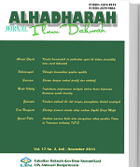The Relationship of the Muhadharah Program to improving Students’ Public speaking Skills at the Islamic Centre Al Quds of the Dewan Da’wah Sumatera Barat / Dampak Program Muhadharah terhadap Keterampilan Berbicara di Depan Publik Siswa di Islamic Centre Al-Quds, Dewan Dakwah Sumatera Barat
DOI:
https://doi.org/10.18592/alhadharah.v24i1.17178Keywords:
Muhadharah Program, Public speaking, Students, Communication, Islamic CentreAbstract
This study examines the impact of the Muhadharah program on students’ public speaking skills at the Islamic Centre Al-Quds, West Sumatra. The topic highlights the importance of mastering oral communication skills for da’wah, academics, and career development, alongside the need to evaluate the program’s effectiveness. Using a quantitative correlational approach, data were collected from 22 active participants through a Likert-scale questionnaire and evaluation records. Data analysis employed Pearson correlation and simple linear regression. Results showed a positive and significant relationship between the Muhadharah program and students’ public speaking skills (r = 0.603; p = 0.003), with the program contributing 36.4% to skill improvement. These findings confirm that Muhadharah, as a practice-based training program, is effective in enhancing students’ communication abilities within Islamic educational settings.References
Al-Quds, Islamic Centre. 2024. Laporan Program Kegiatan Pesantren Tinggi Al-Quds Dewan Da’wah Sumatera Barat 2024. Padang.
Ati, Azimah Kusuma, dan Ali Ba’ul Chunsa. 2020. “Peran muhadharah dalam melatih kemampuan komunikasi siswa di mi ma’arif polorejo babadan ponorogo.” All-Thifl: Jurnal Kajian Pendidikan Guru Madrasah Ibtidaiyah 1 (1): 1–11.
Dunar, Hilman. 2015. My public speaking.PT Gramedia Pustaka Utama.
Kheryadi, Kheryadi, Muchlas Suseno, dan Samsi Setiadi. 2022. “Evaluasi Program Public Speaking ‘Muhadharah’ Dengan Model (Cipp) Context, Input, Process and Product Pada Tingkat Sekolah Dasar.” Jurnal Holistika 6 (1): 14. https://doi.org/10.24853/holistika.6.1.14-23.
Kholid, Idham, Abbas Abbas, Meisil B Wulur, dan Muhammad Yasin. 2025. “Strategi Public Speaking Dalam Meningkatkan Kepercayaan Diri Santri Melalui Kegiatan Muhadharah Di Pondok Pesantren Matahari Maros.” Jurnal Intelek Insan Cendikia 2 (2): 3726–36. https://jicnusantara.com/index.php/jiic/article/view/2627.
Kurniawan, Azzahra Fancika Putri, dan Jelita Kumalasari. 2022. “Pengaruh Public Speaking Terhadap Kepercayaan Diri Siswa.” Jurnal Psikologi 1 (2): 63–66.
Mehrabian, Albert. 1971. Silent Messages: Implicit Communication of Emotions and Attitudes. First edit. Belmont, California: Wadsworth Publishing Company.
Mukhtar, Ahmad Zarkasyi, dan Parihat Kamil. 2024. “Pengaruh Kegiatan Muhadharah terhadap Kemampuan Public Speaking Santri Pondok Pesantren.” Jurnal Riset Komunikasi Penyiaran Islam (JRKPI) mengutamakan 4 (1): 1–8.
Munawwir, A. W. 1997. Kamus Arab-Indonesia Al-Munawir. Pustaka Progresif.
Mursyid, Muhammad, dan Yono. 2022. “Efektivitas Program Muhadhoroh Terhadap Peningkatan Kemampuan Public Speaking Siswa di Majlis Ta’lim Riyadul Hasanka Kp. Kebon Kopi.” Abdi Dosen: Jurnal Pengabdian Pada masyarakat 6 (1): 42–49.
Naqiyah, Najlatun. 2022. “The Practice of Public Speaking with the Experiential Learning to Improve Self-Efficacy in Students of Islamic Boarding High School.” Journal of Social Science,Art and Humanity 2 (1): 14–21.
https://doi.org/https://doi.org/10.24127/sociometry.v2i1.2318.
Pane, Gina Soya, Mohd Rafiq, Mhd Latip Kahpi, Magdalena Magdalena, dan Nurfitriani M Siregar. 2023. “Program Muhadharah dan Kemampuan Public Speaking Mahasantri (Studi Pada Ma’had Al-Jami’ah UIN Syekh Ali Hasan Ahmad Addary Padangsidimpuan).” Al-Jamahiria : Jurnal Komunikasi dan Dakwah Islam 1 (2): 133. https://doi.org/10.30983/al-jamahiria.v1i2.7369.
Putra, Adam Ichsan. 2024. “Efektifitas Muhadhoroh Terhadap Peningkatan Kemampuan Public Speaking Santri (Pondok Pesantren Markazul Quran Pamijahan Kabupaten Bogor Barat).” KOLONI: Jurnal Multidisiplin Ilmu 3 (1): 2828–6863.
Rahmah, Dian Dwi Nur, Netty Dyan Prastika, Putri Marsha Nasywa Salsabila, dan Arti Wulan Cantika. 2024. “Developing Organization Skills: Tingkatkan Komunikasi Efektif dalam Berorganisasi Menggunakan Metode Experiental Learning.” I-Com: Indonesian Community Journal 4 (2): 616–24. https://doi.org/10.33379/icom.v4i2.4226.
Rahmayanti, Stevfani, Masduki Asbari, dan Siti Fadilah Fajrin. 2023. “Pentingnya Public Speaking guna Meningkatkan Kompetensi Komunikasi Mahasiswa.” Journal of Information Systems and Management (JISMA) 3 (3 SE-Articles): 11–14. https://jisma.org/index.php/jisma/article/view/981.
Safriani, Afida. 2015. “Experiential Learning For Language Teaching Adapting Kolb’s Learning Cycle in Teaching English as a Foreign Language.” In Halaqoh Nasional & Seminar Internasional Pendidikan Islam, diedit oleh FTK UIN Sunan Ampel Surabaya, 378–83. Surabaya: FTK UIN Sunan Ampel Surabaya. https://digilib.uinsa.ac.id/30886/.
Statistik, Badan Pusat. 2022. “Statistik Ketenagakerjaan Indonesia Tahun 2022.”
Sugiyono. 2019. Metode Penelitian Kuantitatif; Kualitatif; dan R&D. Bandung: Alphabet.
Widianti, Hesti, Teguh Prihandoyo, dan Ghea Dwi Rahmadiana. 2024. “Mengasah Kemampuan Public Speaking.” MARTABE : Jurnal Pengabdian Masyarakat 7 (1): 370–76. https://doi.org/http://dx.doi.org/10.31604/jpm.v7i1.370-376.
Wulandari, Aprilia, Sahrun, dan Mustakim. 2022. “Efektivitas Program Pelatihan Kerja terhadap Peningkatan Kompetensi Peserta pada Balai Latihan Kerja Kendari.” REZ PUBLICA: Jurnal Administrasi Negara, Politik-Pemerintahan & Hubungan Internasional 8 (1): 87–97. http://ojs.uho.ac.id/index.php/rezpublica.
Zainal, Anna Gustina. 2022. Public Speaking Cerdas Saat Berbicara di Depan Umum. Purbalingga: Eurika Media Aksara, 2021.
Downloads
Published
How to Cite
Issue
Section
License
Copyright (c) 2025 Muhammad Rizky Hidayatullah, Edi Saputra

This work is licensed under a Creative Commons Attribution-NonCommercial 4.0 International License.
Authors retain copyright and grant the journal the right of first publication, with the work simultaneously licensed under the Creative Commons Attribution-NonCommercial 4.0 International Public License (CC BY-NC 4.0). This license allows reusers to distribute, remix, adapt, and build upon the material in any medium or format for noncommercial purposes only, provided that proper attribution is given to the original creator.







